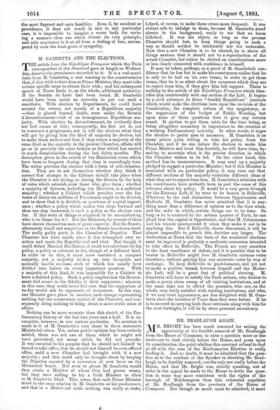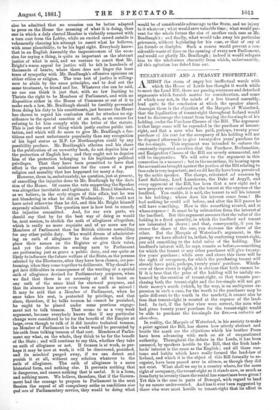MR. BRADLAUGH AGAIN.
ITityhoasf tbheeenfo mibulcehrecmenosvualredof for .seBirzingautghhe oBppRoIrGtulin from the House of Commons, to raise a question more or less- irrelevant to that strictly before the House, and press upon its consideration the point whither this constant refusal to deal at all with the case of the Northampton Election is really leading it. And no doubt, it must be admitted that the ques- tion as to the conduct of the Speaker in directing Mr. Brad- laugh to be forcibly removed, was the only one really before the House, and that Mr. Bright was, strictly speaking, out of order in the appeal he made to the House to settle the ques- tion in some way more consistent with the rights of the borough of Northampton than this reiterated expulsion of Mr. Bradlaugh from the precincts of the House of Commons. But though so much must be admitted, it must also be admitted that no occasion can be better adapted to press on the House the meaning of what it is doing, than one in which a duly elected Member is violently removed with a torn coat from the Lobby, while an excited crowd outside is vehemently cheering his attempt to assert what he believes, with some plausibility, to be his legal right. Everybody knows that in an English Assembly the impressiveness of the occa- sion for saying a thing, is quite as important as the abstract justice of what is said, and we venture to assert that Mr. Bright's warm appeal for justice will be felt in hundreds of thousands of hearts, where there does not linger the least trace of sympathy with Mr. Bradlaugh's offensive opinions on either ethics or religion. The true test of justice is willing- ness to abide by the same principles, and to deal out the same treatment, to friend and foe. Whatever else can be said, no one can think it just that, with no law limiting to Theists the right to be Members of Parliament, and with no disposition either in the House of Commons or out of it to make such a law, Mr. Bradlaugh should be forcibly prevented from doing his duty to his constituents, just because the House has chosen to regard his confession that he attaches no sig- nificance to the special sanction of an oath, as an excuse for refusing to let him comply with the letter of the statute. This is just the sort of thing which justly excites public irri- tation, and which will do more to give Mr. Bradlaugh a fac- titious and most unfortunate popularity than any recognition of his legal status as M.P. for Northampton could by any possibility produce. Mr. Bradlaugh's atheism and his share in the publication of an unworthy book, do not deprive him of the protection of English law ; and they ought not to deprive him of the protection belonging to his legitimate political privileges. That they have been permitted to have that effect is the greatest misfortune for the cause of a pure religion and morality that has happened for many a day.
However, there is, unfortunately, no question, just at present, of cancelling the injustice done to Mr. Bradlaugh by the deci- sion of the House. Of course the vote supporting the Speaker was altogether inevitable and legitimate. Mr. Brand blundered, as we believe, in the early stages of this affair, but he was not blundering in what he did on Wednesday. He could not have acted otherwise than he did, and this Mr. Bright himself expressly admitted. The question now is how best to remedy the injustice committed. And, for our own parts, we should say that by far the best way of doing so would be, next session, to abolish the oath of allegiance altogether, which is really no more requisite and of no more use for Members of Parliament than for British citizens assembling for any other public duty. Who would dream of administer- ing an oath of allegiance to the electors when they place their names on the Register or give their votes, and yet the electors in sending men to Parliament are performing just as grave a public duty, and one quite as likely to influence the future welfare of the State, as the persons selected by the Electorate, after they have been chosen, are per- forming, when they come together to deliberate. Why should we get into difficulties in consequence of the wording of a special oath of allegiance devised for Parliamentary purposes, when we find that there is no necessity at all to insist on any oath of the same kind for electoral purposes, and that its absence has never even been so much as missed ? It may be said that a Member of Parliament, when he once takes his seat, is protected by privilege, and that since, therefore, if he talks treason he cannot be punished, he ought to be placed under some previous engage- ment not to talk treason. That seems to us a very weak argument, because everybody knows that if any particular change were considered to be for the benefit of the Empire at large, even though to talk of it did involve technical treason, no Member of Parliament in the world would be prevented by his oath from talking treason of that sort. Members of Parlia- ment say what, on the whole, they think to be for the benefit of the State ; and will continue to say this, whether they take an oath of allegiance or not. If treason is at work, as per- haps it may be now at work, it will be discovered, punished, and its mischief purged away, if we can detect and punish it at all, without any relation whatever to the oath of allegiance. The oath of allegiance is a mere historical form, and nothing else. It prevents nothing that is dangerous, and causes nothing that is useful. It is a form, and nothing more. We believe, therefore, that if the Govern- ment had the courage to propose to Parliament in the next Session the repeal of all compulsory oaths as conditions sine qua non of Parliamentary service, they would be doing what would be of considerable advantage to the State, and no injury to it whatever ; what would save valuable time ; what would pre- vent for the whole future the rise of another such case as Mr. Bradlaugh's ; and finally, what would take away his particular grievance, without legislating for his case, or that of any of his friends or disciples. Such a course would prevent a con- siderable waste of time on the opening of every new Parliament, and would not glorify Mr. Bradlaugh ; indeed it would relegate him to the wholesome obscurity from which, unfortunately, all this agitation has fished him out.































 Previous page
Previous page